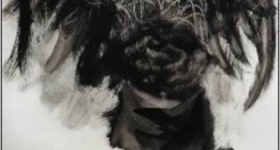“Los Angeles” is the first short story in Ling Ma’s new collection, Bliss Montage, and a city that I moved away from six weeks ago. When I left, I said goodbye to friends, family and familiarity for a new life in Montana. Under these circumstances, reading Bliss Montage became a source of comfort. Ma weaves the surreal with the fabric of everyday life until they are nearly indistinguishable, with such seamlessness that there is great pleasure in visiting the world through her eyes.
In “Los Angeles,” a woman lives in a sprawling complex with her wealthy husband, children and 100 ex-boyfriends. She has attained a monied, respectable life, but she is adrift, coasting through the L.A. sprawl with the ex-boyfriends, touring the recent past. From her expensive new home high in the hills, she watches the girl who lives in her old studio apartment — the girl is drinking juice, the girl is standing hunched over the kitchen sink. The girl lives in the real world; our narrator’s world is hollowing out from the inside. Still, the narrator tries to build a new life for herself, though the past and its attendant memories of violence will not leave her. All of her boyfriends leave, her husband crumples into himself — what is left for our narrator but a magnificent shell of a life?
It's these shells that characters in Ma’s new stories are frequently trying to fill. They’re stuck in place but alert to opportunities that will shake them free from stasis. Some of these themes are familiar from Ma’s first novel, Severance (2018). In her fiction, the unknown often provokes one of two reactions: fleeing, literally and metaphorically, or grasping at the familiar, scrabbling for anything that might constitute a home.
I first read “Los Angeles” in 2017, in Granta, and in the years since, have returned to the saved tab on my phone again and again. The story captures disorientation in a way that helped me understand my own disorientation in the first strange, fragile days of crawling back to a city whose suburbs I had grown up in, where I thought I’d never return. That disorientation has now taken on a new shape — leaving a place that was once alien, but that from the rearview mirror, looks a lot like home.
Putting down roots, yanking them up — the hope for escape into new lives runs throughout the stories of Bliss Montage. In “G,” a woman named Bea visits her childhood friend, Bonnie, for the last time before moving across the country. She’s persuaded to take a last trip together on G, a drug that drapes like an invisibility cloak, allowing its users to lay themselves bare. Its properties can be harnessed to wreak havoc in the city, or to drift further and further out into the sea of the mind until the user loses her corporeal body. Bonnie is Bea’s anchor to the past, and she can’t allow Bea to go swimming freely towards her future. As Bea loses her body, she tries to speak: “Except what came out weren’t words, only a sound like ocean waves seething against beach pebbles. As soon as I heard myself, I had the sensation of sinking.”
The fantasy of a new life, Ma shows us, so often drowns under the weight of the past. It’s hard to wrestle free. It’s a familiar theme in immigration narratives, but in these stories, the rupture of leaving the homeland is already in the past, an old wound — healed but puckered, never completely smoothed away. Instead, Ma’s characters attend to what comes after, contending with their sense of difference, of not-quite-rightness. They rest lightly in their lives, waiting to see if they’ll find themselves at home here, even when there’s no other home to go back to.
In “Tomorrow,” a woman, Eve, falls pregnant in a near-future where American global power has finally collapsed and where birth defects — such as her fetus’ arm hanging down from between her legs — are not uncommon. She feels that surging call of “returning, of a homecoming” back to the homeland. Once back, there’s comfort and nostalgia, but there’s also the palpable tension between what should have been and what is. Details, like the clipped British voice of the translation app Eve uses to speak to her great-aunt, press up against scenes of intimate histories, such as a great-aunt showing Eve the building where she was born. In the end though, the rupture of the past wins out, and Eve has the hard-won knowledge that “she would never return. She would never come here again.” Sometimes, in order for these characters to have a fighting chance at happiness, they must enact their own ruptures, relentlessly severing away the baggage of the past to surge forward into an unknown future.
An undercurrent of violence is palpable throughout the collection. Sometimes it manifests in the physical — a man’s fist in a woman’s face. But mostly, it thrives in charged moments that balloon with their potential for harm. Ma’s characters are human enough (even the yeti of “Yeti Lovemaking”), but they’re the types of humans whose acts of negotiation thin the surface between the ordinary and the primal. She beautifully tracks these strange edges between not-violence and violence, love and unease in a way that understands how violence can bubble forth from the constant frustration of living with the feeling of not-quite-right. These are characters who are often struggling and flailing, hurting themselves and others along the way.
In the penultimate story, “Peking Duck,” old family memories are re-examined from every angle, seeking to understand the difference between “appropriating someone’s story and making it new through retelling.” The narrative turns into itself over and over again, revealing new angles with each retelling. When the point of view passes from daughter to mother, it feels right — a kind of backwards generational passing of the baton illuminates how the past can ripple forward with its consequences.
Framing and reframing are necessary to untangle the nameless emotions that lie at the intersections of love and violence and shame — those emotions that Cathy Park Hong would call “minor feelings.” These stories have to be told and retold because some of us, immigrants and children of immigrants, are always trying to understand how to find a place to call home.
Reading the stories of Bliss Montage now, several stops removed from a place I might call home, reminds me of the emotions of moving: This is your real life, but it’s a life you might not fully understand yet. But these stories are also a reminder of how to bravely embrace life in a new world. Disorientation is inevitable, time will move in sprints and spurts, but to be startled by the seemingly ordinary can be utterly thrilling. Perhaps it’s better not to fully settle in place but to remain curious and collecting, ready to re-examine everything. It’s wonderful to be lifted away, drifting into another world.










Comments